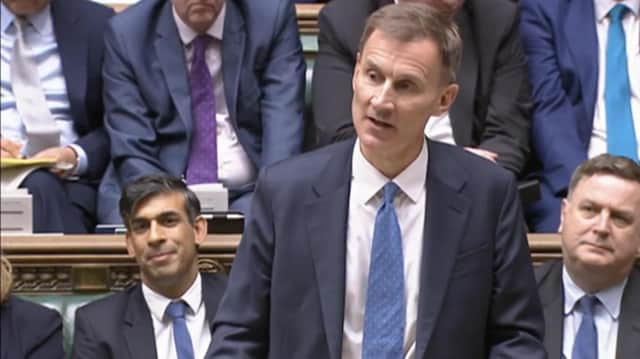Chancellor Jeremy Hunt announces Greater Lincolnshire devolution deal


The new Mayoral Combined County Authority, covering the county of Lincolnshire and North and North East Lincolnshire, will sit above local councils, but below the level of local government.
This addition provides the government with a single point of contact for the region.
Advertisement
Hide AdAdvertisement
Hide AdThe public will vote the Mayor into office, who will then have their own staff and a budget of between £20-25 million a year to spend on the region.
The first election is expected in May 2025. However, with the first allocation of funds arriving in April, a shadow board will be established to oversee £28.4m for capital investment in priority projects.
District, county and combined authority councils will not merge, as devolution is not another tier of local government. The authorities will continue to exist as they are – providing the services they do now.
Mr Hunt announced four areas for devolution in his speech on Wednesday, including Hull and East Yorkshire and Surrey.
Advertisement
Hide AdAdvertisement
Hide AdFollowing his statement, his speech in full was released which confirmed: “The government is also announcing four new devolution deals and an intention to expand Level 2 devolution to eligible councils across England that represent a whole county or functional economic area.
“This includes new Level 3 deals with Greater Lincolnshire, and Hull and East Yorkshire, and Level 2, non‑mayoral, deals with Cornwall and Lancashire. Combined, these new deals, and the extended Level 2 offer, could increase the proportion of people in England benefiting from devolved powers to over two-thirds.”
This initial proposed deal, which will be built on as time goes on, promises an additional three-quarters of a billion pounds of investment fund money over the next 30 years, £24m a year, for Greater Lincolnshire to invest in its priority areas.
These include jobs and skills; infrastructure (for example, housing and highways); transport, the environment and nature; net zero; digital improvements; and innovation and trade.
Advertisement
Hide AdAdvertisement
Hide AdThe Mayor will oversee major projects, including public transport, where an Oyster-style travel card is expected to be introduced.
Mayors elsewhere have controlled budgets for significant public services, including local policing, health spending, and transport in some cases.
They will have their own staff and will be responsible for strategic decisions rather than duplicating services that councils already provide.
However, they will have the power to impose a charge on council tax bills if they choose.
Advertisement
Hide AdAdvertisement
Hide AdLincolnshire has sought devolution of powers and funding for over a decade but initially refused a deal in 2016 because it required a mayor.
Leaders of Lincolnshire County Council and South Kesteven District Council opposed the change. However, there has been a shift in stance, as the latest deal – organised by the leaders of Lincolnshire, North Lincolnshire, and North East Lincolnshire – has progressed.
This time, the government has indicated that significant powers or funding will require a directly-elected mayor, which the leaders seem willing to accept.
Coun Martin Hill, Leader of Lincolnshire County Council, said: “This day is of huge significance. It represents a future of collaboration, bringing with it local and direct control of the things that really matter to the 1.1million residents of Greater Lincolnshire who this proposed new deal is for.
Advertisement
Hide AdAdvertisement
Hide Ad“Devolution means we can invest funding into priority projects like improving transport links and regenerating areas that need it. We’d also have a stronger voice with government about investment and services for our area.
“The proposal includes transferring the government’s adult education budget to us locally so we can ensure courses are available for the skills our residents want, helping them get skilled, high wage jobs.”
Following a formal signing of the proposal next week, Full Council meetings will take place in the three lead authority areas to vote on the proposal. There would then be a public consultation across the whole of Greater Lincolnshire, expected to start in December, before a deal was finally agreed.
The authority has missed a few recent opportunities to advance the deal, including in February 2022 and earlier this year.
Advertisement
Hide AdAdvertisement
Hide AdLincolnshire’s district councils are not directly involved in the plans and have expressed mixed reactions to the deal’s details.
Leaders have generally supported the latest plans, but there that the additional layer of bureaucracy could lead to local government reorganisation and the dissolution of lower-tier authorities.